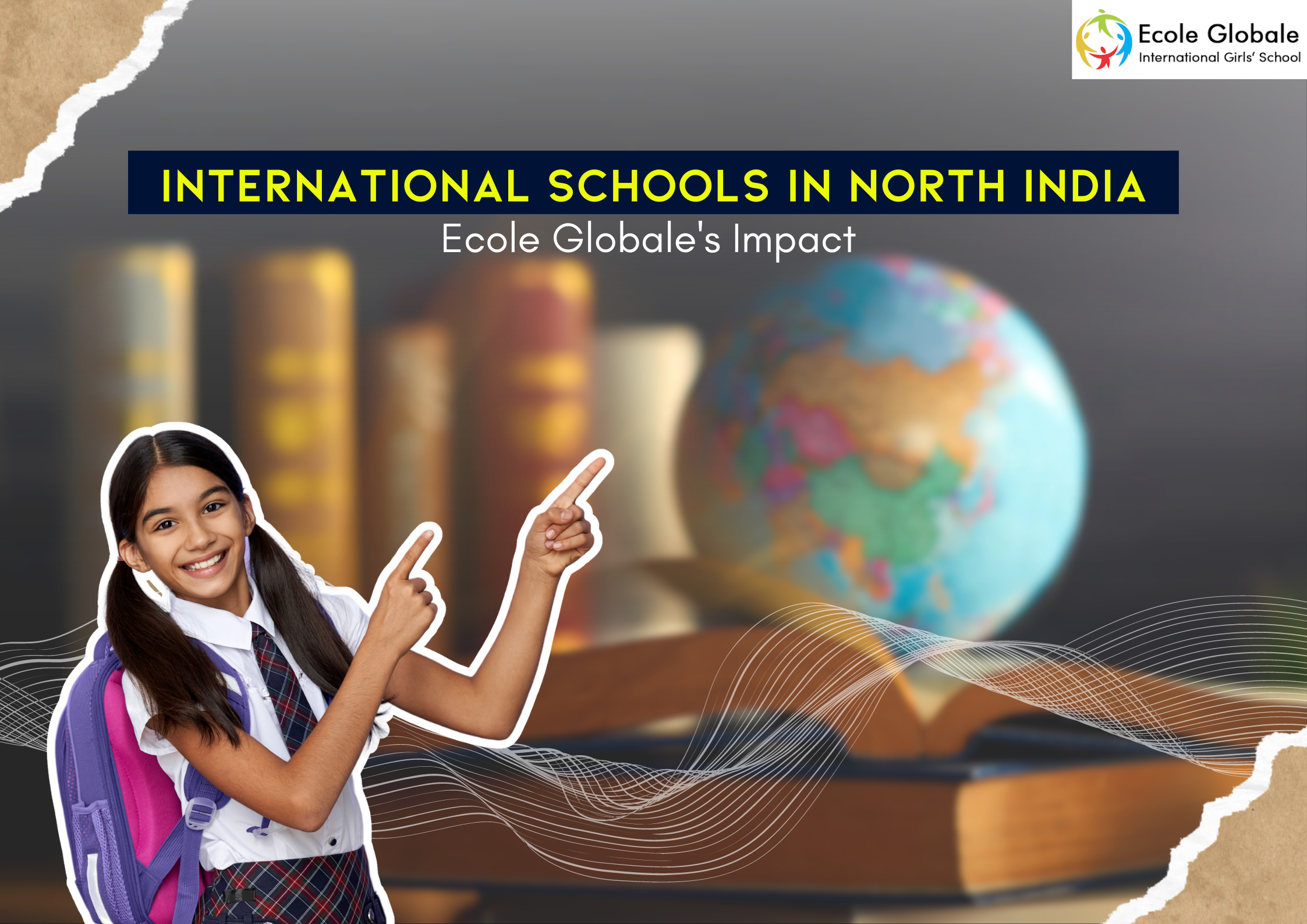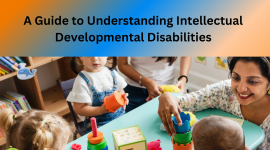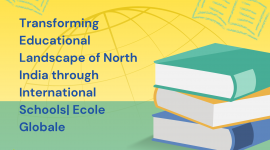The educational landscape in North India is experiencing a profound shift with the rise of international schools, and at the forefront of this transformative journey stands Ecole Globale among top International schools in North India.
This in-depth exploration navigates the contours of international schools in North India, delving into the unique attributes of Ecole Globale and its role in shaping a global perspective on education.
From the historical context of international schooling to the innovative approaches adopted by Ecole Globale, this narrative unveils the dynamic tapestry of education in the region.
The Genesis of International Schools in North India:

The emergence of international schools in North India is a testament to the changing aspirations of parents and students. Traditionally, Indian education has been characterized by a focus on academic excellence and rote learning.
However, as the global landscape evolves, there is a growing recognition of the need for an education that transcends geographical boundaries and prepares students for a world that is increasingly interconnected.
International schools in North India, including Ecole Globale, embody this shift. They introduce global perspectives into the local education system, offering curricula that are recognized worldwide.
The curriculum is designed not only to impart knowledge but also to nurture skills such as critical thinking, creativity, and cross-cultural communication.
Ecole Globale: A Beacon of Global Education by International schools in North India:

Situated in the picturesque city of Dehradun, Ecole Globale has emerged as a trailblazer in the field of international schools in North India. Established with a vision to provide a holistic learning experience, the school embodies the principles of diversity, innovation, and global awareness.
Ecole Globale’s journey is characterized by a commitment to academic excellence, a celebration of cultural diversity, and a dedication to preparing students for the challenges and opportunities of a globalized world.
Key Features of Ecole Globale’s Global Perspective on Education:
Diverse and Inclusive Community:
At the heart of Ecole Globale’s global perspective is its commitment to fostering a diverse and inclusive community. The school intentionally attracts students from various cultural backgrounds, creating a microcosm of the world within its campus.
This intentional schools in North India and diversity enriches the educational experience, exposing students to different perspectives, traditions, and ways of thinking.
Internationally Recognized Curricula:
Ecole Globale distinguishes itself by adopting internationally recognized curricula such as the International Baccalaureate (IB) and Cambridge International Examinations.
These curricula are designed to provide a well-rounded education that extends beyond textbook knowledge. The emphasis on global standards ensures that students are academically equipped for the challenges of a globalized society.
Experiential Learning Initiatives:
Ecole Globale places a strong emphasis on experiential learning, going beyond traditional classroom instruction. The school organizes frequent field trips, international schools in North India with exchange programs, and collaborative projects that provide students with hands-on experiences.
This experiential approach not only reinforces academic concepts but also cultivates a deep understanding of global issues and cultural nuances.
Multilingual Learning Environment:
Recognizing the importance of language in a global context, Ecole Globale creates a multilingual learning environment. The school offers language courses that go beyond curricular requirements, encouraging students to explore and appreciate different languages.
This multilingual approach not only enhances communication skills but also prepares students for effective interaction in international schools in North India settings.
Global Exposure for Faculty and Students:
The faculty at Ecole Globale is carefully selected not only for their academic expertise but also for their global exposure. Educators bring diverse international experiences to the classroom, enriching the learning environment.
Similarly, students are provided with opportunities for global exposure through exchange programs, collaborative projects with international schools, and participation in global conferences.
Impact on Students and the Educational Landscape:

Ecole Globale’s global perspective on education has a transformative impact on students and contributes to reshaping the broader educational landscape as top international schools in North India:
Cultural Competence and Open-mindedness:
The intentional promotion of cultural diversity at Ecole Globale fosters cultural competence among students. Exposure to different cultures instills open-mindedness, tolerance, and an appreciation for diversity. These qualities are essential in a world where individuals need to navigate a globalized society with sensitivity and understanding.
Preparation for a Globalized Workforce:
As the world becomes increasingly interconnected, Ecole Globale’s emphasis on global perspectives prepares students for the globalized workforce. The skills acquired, including cross-cultural communication, adaptability, and critical thinking, position students as assets in diverse professional settings.
Leadership and Innovation:
The school’s commitment to experiential learning and innovative teaching methodologies cultivates leadership skills and a spirit of innovation among students.
They are encouraged to think critically, solve problems creatively, and approach challenges with resilience—attributes essential for leadership roles in the 21st century.
Elevating Educational Standards:
Ecole Globale’s commitment to academic excellence and global perspectives sets a benchmark for educational standards as one of the top International schools in North India.
The success of the school inspires other institutions to aspire to similar levels of excellence, contributing to an overall elevation of educational standards in the region.
Catalyzing Educational Reforms:
The innovative practices and global perspective with international schools in North India is embraced by Ecole Globale serve as catalysts for educational reforms.
The success of the school prompts a reevaluation of traditional teaching methods and curricular structures, encouraging other institutions to adopt more dynamic and globally relevant approaches to education.
Challenges and Future Directions:

While the global perspective on education is gaining momentum, challenges and opportunities lie ahead for Ecole Globale and other international schools in North India:
Affordability and Accessibility:
Ensuring that the benefits of international schools in North India is that its accessible to a broader socio-economic spectrum remains a challenge. Future directions may involve exploring scholarship programs, financial aid initiatives, and collaborations to make quality education more accessible.
Technology Integration:
The integration of technology is an ongoing challenge and opportunity. Future directions may see increased emphasis on digital literacy, virtual classrooms, and the incorporation of cutting-edge technologies to enhance the learning experience.
Sustainability Education:
With sustainability becoming a global priority, future directions may involve a deeper integration of sustainability education into the curriculum. Ecole Globale, with its commitment to global awareness, is well-positioned to lead in this area by international schools in North India.
Continuous Professional Development:
Pioneering excellence requires a commitment to continuous improvement. Future directions may involve further investment in faculty development programs, ensuring that educators stay abreast of the latest pedagogical trends and technologies.
Conclusion:
Ecole Globale’s commitment to a global perspective on education not only positions it as a leader in North India but also contributes to the broader narrative of international education.
The school’s success is a testament to the transformative power of education when infused with global awareness, cultural diversity, and innovative teaching methodologies.
As Ecole Globale continues to shape the educational landscape of International schools in North India, it serves as a beacon for institutions aspiring to provide a truly global and holistic education to the next generation of leaders and thinkers.
Frequently Asked Questions (FAQs)
Q1: How does Ecole Globale’s emphasis on cultural diversity contribute to a unique educational experience, and what specific initiatives does the school undertake to foster cross-cultural understanding among its students ?
A1: Ecole Globale’s emphasis on cultural diversity creates a unique educational experience by bringing together students from various cultural backgrounds.
The intentional promotion of cross-cultural understanding is facilitated through initiatives such as cultural exchange programs, multicultural events, and inclusive curriculum design.
These efforts not only celebrate diversity but also provide students with the opportunity to interact with peers from different cultures, fostering a global mindset and preparing them for a connected world.
Q2: The article mentions Ecole Globale’s commitment to experiential learning. How do the school’s field trips, international exchange programs, and collaborative projects contribute to students’ practical understanding of global issues, and can you provide specific examples of impactful experiential learning at Ecole Globale ?
A2: Ecole Globale’s commitment to experiential learning is evident in its various initiatives, including field trips, international exchange programs, and collaborative projects. These experiences contribute to students’ practical understanding of global issues by providing real-world contexts.
For instance, international exchange programs enable students to immerse themselves in different cultures, fostering a deeper appreciation for global diversity.
Collaborative projects often address real-world challenges, offering students hands-on experiences that go beyond theoretical knowledge, preparing them for active participation in a globalized society.
Q3: In the context of setting benchmarks for educational standards, how has Ecole Globale’s success inspired other institutions, and what specific measures can educational institutions adopt to emulate the school’s commitment to academic excellence and global perspectives ?
A3: Ecole Globale’s success has inspired other institutions by setting benchmarks for academic excellence and global perspectives. Educational institutions looking to emulate this commitment can consider measures such as adopting internationally recognized curricula, encouraging faculty to gain global exposure, fostering cultural diversity, and implementing innovative teaching methodologies.
By prioritizing these elements, institutions can contribute to the elevation of educational standards and better prepare students for a globally interconnected future.
Q4: The article mentions Ecole Globale’s multilingual learning environment. How does the school integrate language education beyond curricular requirements, and what role does a multilingual approach play in preparing students for effective communication in international settings ?
A4: Ecole Globale’s multilingual learning environment goes beyond curricular requirements by offering language courses that encourage students to explore and appreciate different languages.
This approach enhances communication skills and prepares students for effective interaction in international settings. Exposure to multiple languages not only fosters linguistic proficiency but also cultivates a heightened sensitivity to diverse communication styles, contributing to the development of effective global communicators.
Q5: As the article highlights the challenges and future directions for international schools in North India, particularly in the areas of affordability, technology integration, sustainability education, and continuous professional development, what proactive steps can institutions like Ecole Globale take to address these challenges and lead in these areas ?
A5: Institutions like Ecole Globale can take proactive steps to address challenges and lead in areas such as affordability, technology integration, sustainability education, and continuous professional development.
This may involve implementing scholarship programs to enhance affordability, embracing cutting-edge technologies for enhanced learning experiences, deepening the integration of sustainability education into the curriculum, and consistently investing in faculty development programs to ensure educators are well-equipped with the latest pedagogical trends and technologies.
By taking these proactive measures, international schools in North India institutions can navigate challenges and remain at the forefront of global education.










